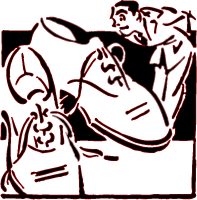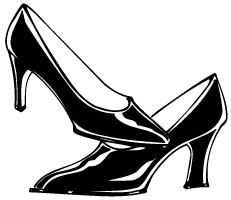Ballroom Dance Shoes
Ballroom dance shoes are lightweight shoes with either suede (chrome leather) or smooth leather soles. Flats for men and women have 1 or 1.5 inch heels and generally cost $100-120, although there are some cheaper domestic models. Ladies' high-heeled shoes typically have 2 to 3 inch heels and run about $60-120.
 Selection Criteria
Selection Criteria
Shoes should be chosen not only for appearance but also for comfort, support, performance, and protection. Some ballroom dance shoes are built poorly; in particular, look out for sharp edges near your ankle and for interior seams that will abrade your foot.
Some women prefer closed-toed shoes because they offer a little more protection against being stepped on than do open-toed models, and because they shield your toenails from your partner's shoes. Women's shoes sold for Latin dancing tend to have a higher, slimmer heel and a softer, more flexible sole than do those intended for Standard dancing. Ladies: if high heels hurt, try adding arch supports, or consider wearing flats. Any orthopedist will tell you that high heels are not particularly good for your feet.
The performance of a shoe depends primarily on its sole. New or well-brushed suede (chrome leather) soles are generally considered to offer just the right degree of traction on a wooden dance floor. More-slippery smooth-leather soles may be found on less expensive ballroom shoes.
Vendors
Buying ballroom shoes can be tricky unless you're fortunate enough to have a well-stocked ballroom shoe vendor in your area. Dance supply stores such as Capezio will carry Jazz and character shoes, and some of their outlets will also offer a narrow range of ballroom shoes. Ballroom dance studios often sell several models of ballroom shoes, but their stock on hand is usually limited, meaning that you might not be able to try on the model that you want in your size.
 If
you can't find a good ballroom shoe at a local store or studio, you can
try shopping at dance competitions or dance camps. Shoe vendors often set
up shop at ballroom dance competitions and ballroom dance camps, and they
tend to bring large stocks of shoes; you can try on many pairs, and you're
likely to find the model that you want in your size. The vendors will typically
operate outside of the ballroom in which the competition or camp is held,
so you usually do not require admission to the event to shop for shoes.
If
you can't find a good ballroom shoe at a local store or studio, you can
try shopping at dance competitions or dance camps. Shoe vendors often set
up shop at ballroom dance competitions and ballroom dance camps, and they
tend to bring large stocks of shoes; you can try on many pairs, and you're
likely to find the model that you want in your size. The vendors will typically
operate outside of the ballroom in which the competition or camp is held,
so you usually do not require admission to the event to shop for shoes.
If neither competitions nor camps are convenient, consider purchasing ballroom shoes by mail order. Mail-order vendors generally offer a wide range of shoes and hold large inventories. The obvious disadvantage to mail order is that it's hard to evaluate a shoe from a catalog picture. However, most mail-order stores have reasonable exchange policies; if you return the shoe clean and unworn, they will not only accept it but also absorb the cost of shipping you a different pair. For widest selection, I suggest that you order free catalogs from some or all of the vendors below, or visit their web sites.
Note: if a vendor's toll-free (800) or (888) phone number is unreachable from your calling area, try the toll number provided.
|
Store |
Telephone |
Store |
Telephone |
|---|---|---|---|
|
(408) 773-8833
|
none listed
|
||
|
(408) 871-1895 |
(410) 990-0009 |
||
|
(585) 259-9680
|
(800) 851-2813 (702) 365-6650 |
||
|
(800) 322-7856 (415) 421-5657 |
(888) 825-7768 (305) 271-0606 |
||
|
(800) 854-4318 (619) 287-5787 |
(888) 600-9091 |
||
|
(800) 40-DANCE (323) 874-8704 |
(818) 788-3216 |
||
|
(239) 418-1117
|
(405) 379-3872 |
||
|
(800) 881-3262
|
(231) 903-7666
|
||
|
Dance Distributors |
(800) 33-DANCE (717) 234-3572 |
(800) 745-4758 (770) 936-5763 |
|
|
(800) 774-1106 (407) 774-1106 |
(914) 632-0428 |
||
|
(800) 292-1510 (212) 399-0465 |
none listed
|
||
|
(760) 757-6032
|
(800) 433-5541 (770) 455-7122 |
||
|
(770) 428-9439
|
(888) 793-7681 (905) 793-7681 |
||
|
(888) 800-8388
|
(800) 888-5429 (770) 455-9799 |
||
|
(402) 689-9987
|
Sizes
Dance shoes are typically made and sold according to European shoes sizes, which are generally but not always 1.5 sizes smaller than their American counterparts. That is, a man who wears an American size 10 will usually wear a European size 8.5. This is not a hard-and-fast rule, so it's best to discuss sizes with the salesperson.